- Home
- Vince Flynn
Vince Flynn Collectors' Edition 2 Page 2
Vince Flynn Collectors' Edition 2 Read online
Page 2
SENATOR HANK CLARK was a large man who inside the Beltway was affectionately referred to by some as John Wayne. Clark had the size, the swagger, and most notable, the gift of making people feel important when they were around him. Not to say that Hank Clark was altruistic. He wasn’t. Clark had no aversion to making enemies in life; he just found it suited his needs much better when the other person thought he was a friend. He was, after all, a politician. Like a well-schooled assassin, he knew that it was much easier to slit someone’s throat when they allowed you to get close. That was why, in an increasingly divided Washington, the Republican senator from Arizona was one of the few politicians left who could truly reach across the aisle. Clark made no public enemies, and he made very few in private. He was a likable man, and he used his amiable style to find people’s weaknesses. Senator Henry Thomas Clark was a truly dangerous man.
Clark looked out over the beautiful blue water of the Caribbean and smiled. He had done very well for himself. His private compound on the tip of the island had its own lagoon and over fifty acres of lush privacy. Inside the compound were a gatekeeper’s house, a guesthouse that overlooked the quaint lagoon and the grand main house with commanding views of the ocean. All three were done in a tasteful Mediterranean style. Clark was standing on the terrace of the main house. Thirty feet below the surf pounded into the sheer rock cliff. Standing as he was, leaning out over the water, was like being on the bow of ship. The bright orange sun was slipping over the horizon. It was another day in paradise.
He’d gone from trailer trash to the U.S. Senate. Clark smiled, took a drink and thought, Only in America could a kid grow up in poverty with a father and mother who were drunks and go on to become a multimillionaire and a U.S. senator. Clark knew there were those who would find the line pat, but he doubted they had started out so low in life and risen so high. Not Clark though. Not a day passed when he didn’t think of how far he had come, and how far he still intended to go.
His father was an abject failure in every sense of the word. So much so that he blew his head off when Hank Clark was a boy. The memories of his youth were a constant reminder of how bad things could be. No father, a mother who was drunk every day of the week and the stigma of living in a trailer park. Fortunately for Hank Clark his parents had unwittingly given him one true gift: a 90-mph fastball and a wicked curve. That was his ticket out: a full ride to Arizona State University. After school Clark had gone into commercial real estate and development in a fledgling suburb of Phoenix called Scottsdale. Clark’s life from that point forward had been one success after another. By thirty he had made his first million. By thirty-five he was set for life and decided to go into politics. He served one term in the U.S. House of Representatives and then it was on to the Senate, where he was now in the middle of his fourth term. One would think that this would be enough for most people, but not Hank Clark. He wasn’t done achieving yet. There was one more job he wanted.
Unfortunately, several people in Washington weren’t cooperating at the moment. That, Clark knew, was why Mark Ellis had decided to make his unscheduled trip to the tiny island. Clark was a wealthy man, but he had no intention of throwing away all of that hard-won money. That was why he needed Ellis and his friends. They had serious money, they weren’t simple millionaires, they were billionaires, and they weren’t shy about doling some of their billions out for access and information.
Clark sighed and shook his head at the tedious road ahead. Information, that’s what this whole mess was about. Knowledge truly was power, and men like Ellis understood that Clark could help give them the knowledge they needed to grow their billions and protect their kingdoms. Even over the roar of the surf Clark heard Ellis enter the house. Clark and Ellis shared a thirst for power and that was about it. Where Clark was calm and discerning, Ellis was volatile and brash. The man had a way of wearing people out through frontal assault after frontal assault. Nothing tricky, no feints, he just hammered you into submission. Clark found it all very interesting. He was a true tactician, and often relished outmaneuvering people like Ellis, but tonight, in the warm Caribbean air he would prefer drinks, some light fare and the smooth skin of a young woman flown in from Miami.
Ellis strode out onto the terrace at full speed like an impetuous prince delivering bad news from some far-off front. His demeanor was very out of place in the laid back atmosphere of Clark’s private retreat, and the senator made an effort not to let his irritation show.
There was no hello, no comment on the weather or the beauty of the setting sun. Ellis forcefully slapped down a copy of the San Francisco Chronicle on the small wrought iron table near Clark and kept his eyes focused on the man. “What in the hell is this all about?”
“Good evening, Mark. How was your flight?”
“Never mind my flight,” barked Ellis as he looked up at the much taller and more substantial Clark. “Explain this to me.” Ellis pointed at the paper, but kept his eyes on the senator.
Clark glanced down at the paper and said, “Mark, you’ll have to read it to me. I don’t have my glasses with me.” Clark smiled as Ellis snatched the paper off the table. This might be enjoyable after all: the bull and the matador.
“The headline reads, New CIA Director. Sources close to the president say that next week he will nominate Dr. Irene Kennedy to become the next director of the CIA. If Kennedy is confirmed she will become the first woman to head the spy agency.” Ellis threw the paper back down on the table in disgust. “You told me you would take care of this mess.”
“Yes, I did tell you that, and, yes, I am taking care of it.”
“How, just how in God’s name are you taking care of this, Hank? You are not my only source in Washington,” spat Ellis. “I’m hearing things.”
Clark took a drink and gauged the sincerity of the thinly veiled threat. “What are you hearing?”
“I’m hearing Kennedy won’t play ball. I’m hearing if she finds out about our little arrangement she will blow us out of the water.”
Shaking his head, Clark replied, “As for your first point, I’m not entirely convinced she won’t play ball, and as for your second point, she would never go public with our business dealings.”
“How can you be so sure?”
With absolute sincerity, Clark replied, “She’d probably have you killed instead.”
Taking half a step back Ellis gave the senator a questioning look. “You can’t be serious?”
“Oh, I’m very serious. I don’t know who your other sources are, but I will guarantee you they don’t know Dr. Kennedy as well as I do. She was taught by the best. That agency has never seen anyone as competent, efficient and lethal as Thomas Stansfield, and I doubt they ever will . . . but Kennedy will be the next best thing. I have no doubt that Stansfield has left her with his files.” Clark turned and looked out over the water. “All the secrets he compiled during his fifty-plus years of service in the intelligence business. I know some very powerful men in Washington who are very nervous about her nomination.”
Ellis clenched his fists in a show of frustration. “Then why in the hell don’t you guys tell the president to withdraw his nomination and get someone in there who we can manage?”
“It’s not that easy, Mark. These men are afraid of her. They are afraid of what she knows, and they would prefer not to draw any attention to themselves.”
“Bullshit! I don’t care how many of them are afraid of her. I don’t care how many of them lose their jobs or their wives or whatever it is they are afraid of losing—”
“How about their freedom?” Clark asked with an arched brow.
“What do you mean, freedom?”
“Some of them would like to stay out of jail.”
“Oh, come on.”
“You’d better get some new sources in Washington, Mark.” Clark started back toward the house. “I’m going to get another drink. Would you like one?”
Ellis hesitated for a moment and then followed. “My sources are fine.” He stared s
keptically at Clark’s broad back and concluded, “I see what you’re trying to do. You’re trying to scare me into backing down. And I’m telling you right now I’m not going to.”
Clark stepped behind the simple granite bar with two large bay windows behind it. The bottles were kept on a speed rail beneath the bar. Reaching for the Scotch, he said, “Your little investigative firm that you use in Washington”—Clark allowed himself a slight chuckle—“I suppose they’re fine if you’re looking for a little dirty laundry on one of my colleagues or a reporter you don’t like . . . or if you want to look through the garbage of one of your competitors.” Clark stopped. “Oh, I’m sorry, I forgot, they got caught doing that.” Grabbing a glass for Ellis, he poured him some tequila. “That was rather embarrassing for you, wasn’t it?” Clark flashed his guest a smile, and then raised his glass in a salute before touching it to his lips.
Ellis muttered several swear words under his breath and took a drink. The situation the senator was referring to was a disaster for the billionaire. He had hired a private investigative firm in Washington to spy on the lobbying office of one of his chief competitors. The sleuths attempted to bribe the night cleaning crew by giving them cash for garbage. The cleaning crew reported this to their employer and the cops stepped in and busted the employees of Leiser Security. It was later learned that Ellis had hired the firm. Ellis hid behind a shield of lawyers and no charges were ever filed, but on a personal level the incident was the talk of Silicon Valley. Ellis avoided the social scene for months and was on the wrong end of some very scathing jokes.
Knowing no other style, Ellis refused to be deterred by the senator’s embarrassing reference. “That has nothing to do with what we’re talking about. I don’t buy this crap that a bunch of senators are scared of Kennedy, and if they are, that’s all the more reason to block her. You’re not making any sense.” Ellis shook his head and frowned.
“Mark, it’s basic risk reward,” intoned Clark as if he were speaking to a teenager. “Not everyone in Washington wants to raid the CIA like you do. Most of them think that Kennedy will do just fine, in fact probably better than anyone else we could find. To them there is no reward in blocking her nomination.” He took a drink of Scotch and added, “Only risk.”
“I’ll offer them some reward. I’ll fill their reelection coffers with cash.”
The senator thought about this for a second. “That might work on a few of them, but not enough to make it happen. The only way to stop her nomination at this point is to find something damaging in her past. The senators on my committee will not vote against her over differences of opinion. She has too good of a reputation for the work she’s done as the head of Counterterrorism.”
“Then we’d better find something in her past and end this thing before it gets started.”
“I’ve looked, and there isn’t anything.”
“Bullshit. You don’t get to where she is without breaking some of your stupid oversight rules.”
Clark knew in fact that Kennedy had trampled all over those rules, but she had done so because Clark and several other very important senators had asked Thomas Stansfield to do something about the increase in terrorist attacks against the U.S. The result was the formation of the Orion Team. An organization supported by the Agency but outside the Agency. Their job in a nutshell was to take the war to the terrorists. The hunters became the hunted. To use the Orion Team against Kennedy would be a very risky proposition. If she decided to take others down with her, it could get very ugly indeed. That particular information was far too valuable to trust Ellis with, though, so Clark just shook his head and said, “There is nothing. Believe me, I’ve looked.”
“Maybe your sources aren’t as good as you thought,” replied Ellis, who was very proud of himself for using Clark’s own retort against him.
Unflappable as ever, Clark flashed a big grin and said, “I am my own source.”
“Well, I’m going to have some people check her out.”
“Be my guest, but be very careful.”
“Why? What in the hell do I have to fear from her?”
“Oh, Mark, you don’t know where you tread. Do you know anything about this woman’s mentor?”
“Stansfield?”
“Yes.” Clark grinned in admiration for the old spymaster. “Thomas Stansfield was not afraid to have people eliminated.”
“You mean killed.”
“Of course, but only those who were stupid enough to plot against him and let their identities be known.”
“So you think Kennedy has the same ruthless side that her boss did.”
“Oh, I never said it was ruthless. Thomas Stansfield was not a ruthless man. He was very calculating. If you tried to do this country harm, or his agency, or him personally,” Clark shook his head, “you were apt to end up dead.”
“You didn’t answer my question,” Ellis stated with irritation in his voice. “Is Kennedy capable of having someone killed?”
“I’m not sure, but I sure as hell don’t want to find out.”
The billionaire stomped his foot on the ground like a petulant child. “Dammit, I am getting killed! My portfolio is down forty percent! My investors are down over fifty percent! It’s bad enough that the market is in the tank, but it’s unacceptable that I’m flying blind! I spent way too much fucking money on Echelon!” Ellis pointed to himself and shouted, “I want a return on my fucking investment!”
Clark was about to tell Ellis to calm down, but thought better of it. The man was beyond recovery at the moment. His thoughts turned to Echelon, the supersecret program started by the National Security Agency back in the seventies. Through a series of ground stations located around the globe and satellites in space the agency began intercepting telexes, faxes and phone calls. Using supercomputers and highly advanced voice recognition software the NSA was able to sift through millions of calls daily, and sort out the ones that were interesting. Somewhere along the way some people got the bright idea of targeting certain foreign companies that were direct competitors of U.S. firms. The information was then passed along to, for example, a certain U.S. telecommunications company that was up against a French company for a lucrative bid. Echelon continued to morph into the nineties. Worried about the spread of U.S. technology, the supersnoops at the NSA began to monitor communications in and out of Silicon Valley. Senator Clark, as Chairman of the Senate Select Committee on Intelligence, got to see what was being discovered firsthand. The information he got was valuable to men like Mark Ellis. Who was working on what? How close were they to bringing their product to market? Who wanted to buy whom? Ellis had made a killing on the information. Clark had helped to create a monster, and now he was forced to deal with it.
After the long moment of thought Clark said, “It is not my fault that Echelon was shut down.”
“Well, you guys should have killed that bitch when she went to the press and blew the whistle.”
The “bitch” Ellis was referring to was an employee of the NSA who had heard one too many intercepted phone calls and decided it was a bad thing for the U.S. government to be spying on its own people. “Mark, we like to avoid killing people after they’ve gone to the press. It looks rather bad.”
“Don’t patronize me. There are ways.”
“And we tried all of them.” Ellis was actually getting under Clark’s skin. “We made her look like an absolute nut and scared everybody with the exception of 60 Minutes away. You aren’t in jail; I’m not in jail . . . no one is in jail. No one has even been brought up on charges, Mark. I’d say we did a pretty good job of handling what was very close to being a disaster.”
“This is a disaster!” snapped Ellis. “Didn’t you hear me? My portfolio is down forty percent. My clients are getting killed and some of them are threatening to walk.”
Clark breathed a heavy sigh and placed a hand on Ellis’s shoulder. Leading him back toward the terrace he said, “Two years from now, your portfolio will be back up. Ten years from now it will
be double what it was before this whole mess started. Everybody is getting killed right now.”
“I’m not everybody,” moaned a frustrated but slightly calmer Ellis. “I want Echelon back. I want a CIA director who will play ball. I need that information.”
Clark kept his hand on the billionaire’s shoulder as they stopped near the edge of the terrace. “Mark, I will get you the information you need. I promise.”
“What about Kennedy? You’ve told me before we have no chance of controlling her.”
“I said it would be difficult, not impossible.” While squeezing Ellis’s shoulder Clark looked out across the water and thought of a possible solution. The trick was to get someone else to do his dirty work. He had to stay above it all. He had to stay close to the president and maintain his confidence. Then when everything was right he would strike.
2
MARYLAND, MONDAY MORNING
Mitch Rapp woke up on his stomach. He reached over to find Anna but she wasn’t there. He had no desire to move so he simply lay there, thinking about how tired he was. His left shoulder was painfully stiff. He would have liked to think it was from the time he dislocated it playing lacrosse for his alma mater Syracuse University, but he knew it was something a little more serious. The real damage had been done by a bullet. At thirty-two Rapp was a beat-up old man. He had barely taken a break since graduating from college. For years he had been obsessed with the fight against Islamic terrorists, obsessed with killing as many of them as he could before they had the chance to do the same to innocent people whose only crime was that they disagreed with the zealots’ bastardization of Islam.
There were days when Rapp wondered if he had really made a difference. After all, the crazies were still out there threatening to bring Armageddon to America. In his rare moments of self-pity, he thought it was all for naught. He knew deep down inside, though, that he’d made a huge difference. He had never bothered to count each and every person he’d killed. The obvious reason was that he preferred not to know, and the more practical one was that there was no way he could ascertain the actual number. Machine guns and explosives, the indiscriminate weapons of war, made the tally impossible, but the number was large. Rapp knew it was well over fifty and possibly one hundred, and those were only by his hand alone. If he counted the times he’d helped lead Special Forces units on takedowns, or the times he painted a target so U.S. jets could drop laser-guided bombs, the number was easily double if not triple.

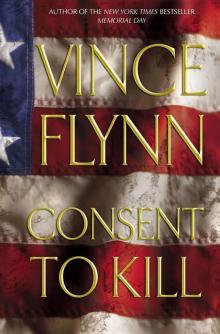 Consent to Kill
Consent to Kill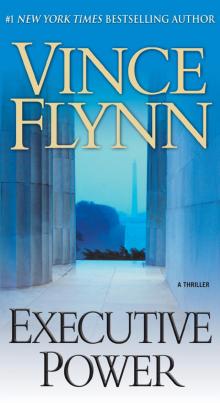 Executive Power
Executive Power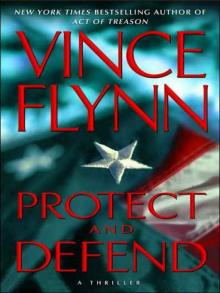 Protect and Defend
Protect and Defend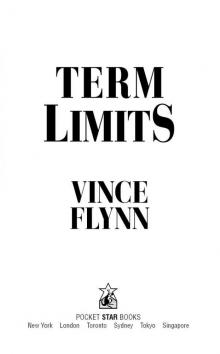 Term Limits
Term Limits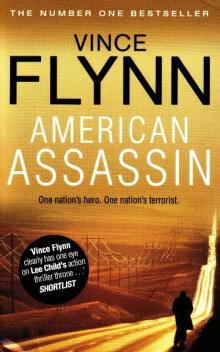 American Assassin
American Assassin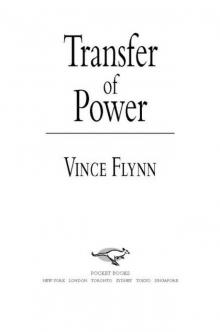 Transfer of Power
Transfer of Power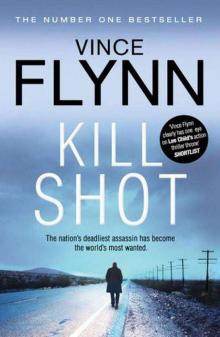 Kill Shot
Kill Shot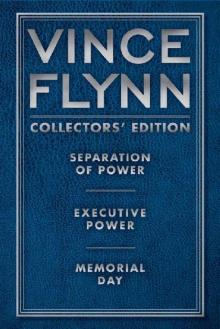 Vince Flynn Collectors' Edition 2
Vince Flynn Collectors' Edition 2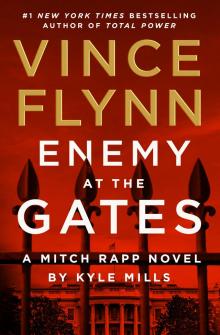 Enemy at the Gates
Enemy at the Gates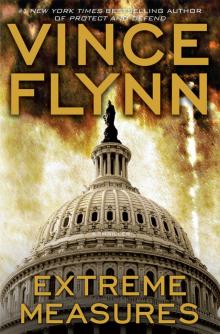 Extreme Measures
Extreme Measures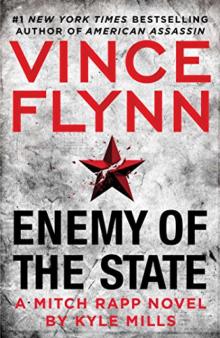 Enemy of the State
Enemy of the State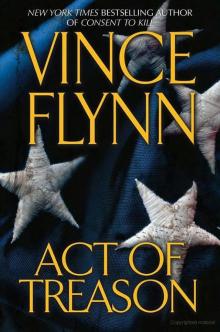 Act of Treason
Act of Treason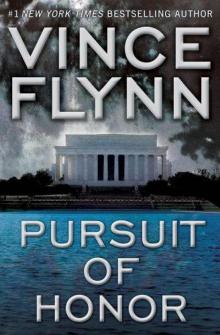 Pursuit of Honor
Pursuit of Honor The Survivor
The Survivor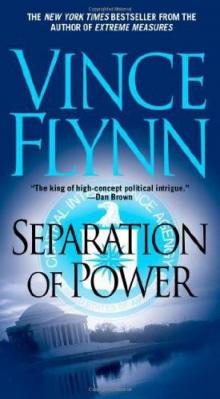 Separation of Power
Separation of Power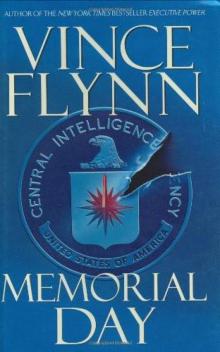 Memorial Day
Memorial Day The Last Man
The Last Man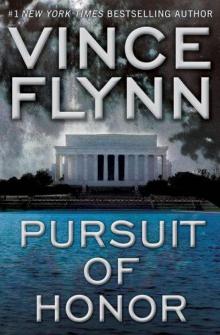 Pursuit of Honor_A Thriller
Pursuit of Honor_A Thriller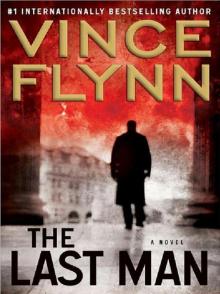 Mitch Rapp 13 - The Last Man
Mitch Rapp 13 - The Last Man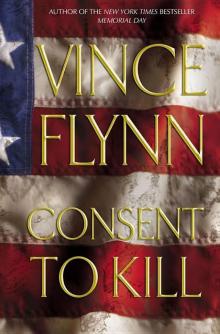 Consent to Kill:
Consent to Kill: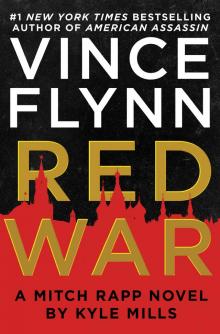 Red War
Red War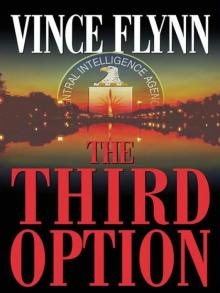 Mitch Rapp 02 - The Third Option
Mitch Rapp 02 - The Third Option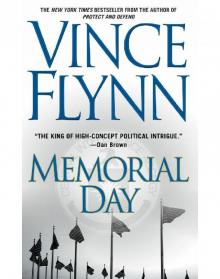 Mitch Rapp 05 - Memorial Day
Mitch Rapp 05 - Memorial Day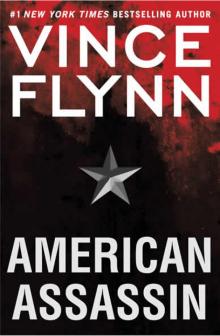 Mitch Rapp 11 - American Assassin
Mitch Rapp 11 - American Assassin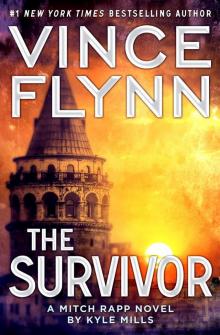 Mitch Rapp 14 - The Survivor
Mitch Rapp 14 - The Survivor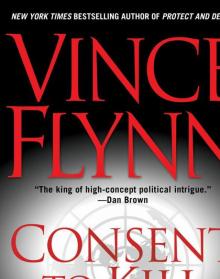 Mitch Rapp 06 - Consent to Kill
Mitch Rapp 06 - Consent to Kill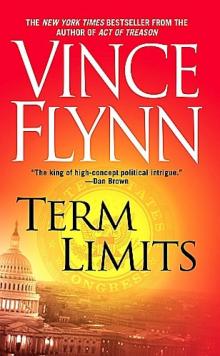 Term Limits mr-1
Term Limits mr-1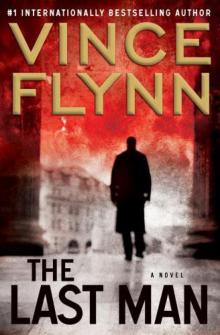 The Last Man mr-13
The Last Man mr-13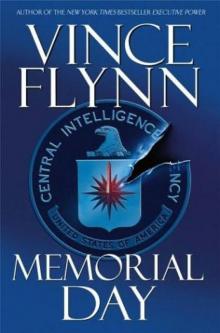 Memorial Day mr-5
Memorial Day mr-5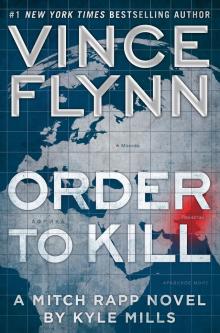 Order to Kill
Order to Kill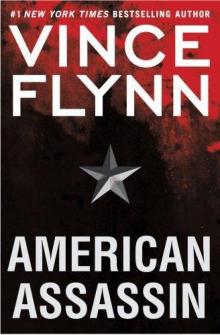 American Assassin: A Thriller
American Assassin: A Thriller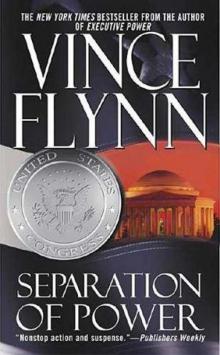 Separation of Power mr-3
Separation of Power mr-3